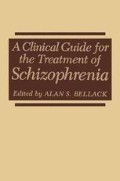Abstract
During the past 20 years crisis intervention has been developed into a technique for the treatment of acute schizophrenic episodes. Several program models have appeared to provide intensive, crisis-oriented treatment for severely disturbed psychiatric patients in a wide spectrum of settings, including crisis residential programs, crisis day treatment centers, crisis-oriented hospital inpatient units, crisis family treatment centers, mobile crisis units, and crisis clinics. Many of these programs were developed to function as alternatives to hospitalization or continued hospitalization.
Access this chapter
Tax calculation will be finalised at checkout
Purchases are for personal use only
Preview
Unable to display preview. Download preview PDF.
References
Almond, R. (1974). The healing community. New York: Aronson.
Baldwin, B. A. (1977). Phases of emotional crisis. Unpublished training materials.
Bengelsdorf, H., & Alden, D. C. (1987). A mobile crisis unit in the psychiatric emergency room. Hospital and Community Psychiatry, 38, 662–665.
Burgess, A. W., & Baldwin, B. A. (1981). Crisis intervention theory and practice. Englewood Cliffs, NJ: Prentice-Hall.
Caplan, G. K. (1964). Principles of preventive psychiatry. New York: Basic Books.
Doherty-Holmlund, K., Rehm, D., & Salhany, J. (1986). Acute alternatives to hospitaliza-tion. Paper presented at the Riviera Hotel, Las Vegas, Nevada.
Foxman, J. (1976). The mobile psychiatric emergency team. In H. Parad, H. L. P. Resnik, & L. Parad (Eds.), Emergency and disaster management (pp. 35–44). Bowie, MD: Charter Press.
Goffman, E. (1961). Asylums. New York: Anchor.
Gruenberg, E. M. (1969). From practice to theory: Community mental health services and the nature of psychoses. Lancet, 1, 721–724.
Jansen, E. (1980). The halfway house in the United Kingdom and America. In E. Jansen (Ed.), The therapeutic community (pp. 377–386). London: Croom Helm.
Kaskey, G. (1987). Brief psychiatric inpatient care for acutely disturbed patients. Hospital and Community Psychiatry, 38, 1203–1206.
Kent County Mental Health Center. (1986). Description of adult and children’s comprehensive emergency services program (ACESS). Warwick, RI: Author.
Lamb, R. H. (Ed.). (1979). Alternatives to acute hospitalization. San Francisco: Jossey-Bass.
Langsley, D. C., Pittman, F. S., Machotka, P., & Flomenhaft, K. (1968). Family crisis therapy—Results and implications. Family Process, 7, 145–158.
Langsley, D. G., & Yarvis, R. M. (1976). Crisis intervention prevents hospitalization—Pilot program to service project. In H. Parad, H. L. P. Resnik, & L. Parad (Eds.), Emergency and disaster management (pp. 25–34). Bowie, MD: Charter Press.
Lieb, J., Lipsitch, I. I., & Slaby, A. E. (1973). The crisis team. San Francisco: Harper & Row.
Lindemann, E. (1944). Symptomatology and management of acute grief. American journal of Psychiatry, 101, 141–148.
Pasamanick, B., Scarpitti, F., & Dinitz, S. (1967). Schizophrenics in the community: An experimental study in the prevention of hospitalization. New York: Appleton-Century-Crofts.
Polak, P. R. (1978). A comprehensive system of alternatives to psychiatric hospitalization. In L. I. Stein & M. A. Test (Eds.), Alternatives to mental hospital treatment (pp. 115–138). New York: Plenum Press.
Polak, P. R., & Kirby, M. W. (1976). A model to replace psychiatric hospitals. Journal of Nervous and Mental Disease, 162, 13–22.
Polak, P. R., Kirby, M. W., & Deitchman, W. S. (1979). Treating acutely psychotic patients in private homes. In H. R. Lamb (Ed.), New directions fof mental health services: Alternatives to acute hospitalization (Vol. 1, pp. 49–64). San Francisco: Jossey-Bass.
Rosenhan, D. L. (1973). On being sane in insane places. Science, 179, 250–258.
Stein, L. I., & Test, M. A. (1978a). An alternative to mental hospital treatment. In L. I. Stein & M. A. Test (Eds.), Alternatives to mental hospital treatment (pp. 43–56). New York: Plenum Press.
Stein, L. I., & Test, M. A. (Eds.). (1978b). Alternatives to mental hospital treatment. New York: Plenum Press.
Stroul, B. A. (1987). Crisis residential services in a community support system. Rockville, MD: NIMH Community Support Program.
Thomas, C. S., & Weisman, G. K. (1970). Emergency planning: The practical and theoretical backdrop to an emergency treatment unit. International Journal of Social Psychiatry, 16, 283–287.
Weisman, G. K. (1985a). Crisis houses and lodges: Residential treatment of acutely disturbed chronic patients. Psychiatric Annals, 15, 642–647.
Weisman, G. K. (1985b). Crisis-oriented residential treatment as an alternative to hospitalization. Hospital and Community Psychiatry, 36, 1302–1304.
Weisman, G. K., Feirstein, A., & Thomas, C. (1969). Three-day hospitalization—A model for intensive intervention. Archives of General Psychiatry, 21, 620–629.
Wilder, J. F. (1966). A two-year follow-up evaluation of acute psychiatric patients treated in a day hospital. American Journal of Psychiatry, 122, 1095–1101.
Author information
Authors and Affiliations
Editor information
Editors and Affiliations
Rights and permissions
Copyright information
© 1989 Springer Science+Business Media New York
About this chapter
Cite this chapter
Weisman, G.K. (1989). Crisis Intervention. In: Bellack, A.S. (eds) A Clinical Guide for the Treatment of Schizophrenia. Springer, Boston, MA. https://doi.org/10.1007/978-1-4757-8979-9_5
Download citation
DOI: https://doi.org/10.1007/978-1-4757-8979-9_5
Publisher Name: Springer, Boston, MA
Print ISBN: 978-1-4757-8981-2
Online ISBN: 978-1-4757-8979-9
eBook Packages: Springer Book Archive

